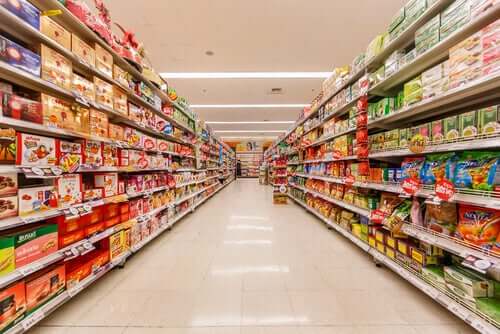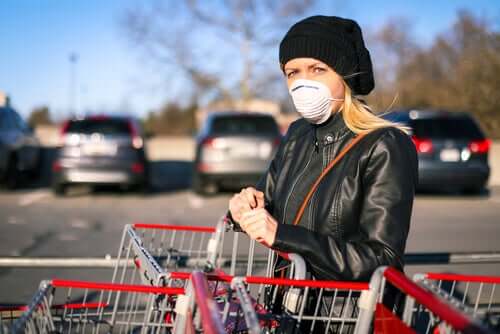Prevent the Coronavirus When Shopping


Written and verified by the doctor Leonardo Biolatto
The coronavirus pandemic has disrupted every aspect of our lives. In fact, we now have to talk about how to prevent the coronavirus when shopping. You need to get food, and you can’t avoid going to the store.
One of the most important features of COVID-19 is that it’s very contagious. Although it’s not very deadly, it has a lot of transmission power and spreads quickly.
Therefore, preventing the coronavirus when shopping should be a top priority. Otherwise, isolation at home would be pointless if you’re spreading germs elsewhere.
Currently, more than 200,000 people are infected worldwide, with over 8,000 deaths. China accumulated the highest number of cases, with around 81,000. Also, Italy is the most affected non-Asian country with almost 25,000 confirmed cases. In the United States, there are over 8,000 cases, and it’s expected to grow.
In fact, the goal of social isolation is to distribute contagion over time in order to let the health systems catch up. That way, they can respond better. Preventing the coronavirus when shopping is one more link in the prevention chain.
Social distancing when shopping
The recommended distance to prevent the spread of coronavirus is at least 3 feet. Supermarkets are no exception. For customers inside, or waiting outside, you should follow this 3-feet rule.
Additionally, stores need to make sure that there aren’t too many people inside. The distance of 3 feet can work as long as there isn’t too big a crowd.
Different supermarket chains have protocols to manage crowds. Therefore, each store will determine how they will control them. The truth is, where there’s mandatory quarantine, there isn’t just a business decision, but also a legal requirement to protect public health.

Keep reading: Important Preventive Measures against COVID-19
Should I wear gloves when shopping to prevent the coronavirus?
Using gloves to touch food at the store is not currently recommended. It wouldn’t help to prevent the coronavirus from spreading.
Using gloves when handling fruit is still a good general measure of good hygiene. Therefore, you should do this all the time, but especially now with a global pandemic.
Washing your hands frequently, using hand sanitizer and ventilating spaces are applicable to supermarkets. Preventing the spread of coronavirus while shopping requires following good habits that benefit all of society.
Find out more: Coronavirus Disease (COVID-19) Symptoms
Prevent the coronavirus from spreading when paying
Paying for your groceries requires contact, so there are certain measures you should take. Make sure that there’s enough distance between you and other shoppers, as well as the cashier.
We don’t recommend using cash. If possible, pay with a virtual wallet or card to reduce contact. COVID-19 can stay on surfaces and some objects, so consider that when choosing how you will pay.
Checkout lines are the responsibility of the supermarket. They need to disinfect them frequently, and hand sanitizer must be available for all self-checkout stations to take care of the customers. As we mentioned, you don’t have to use gloves when checking out.

Is it possible to prevent the coronavirus from spreading while shopping?
Not only is it possible, but it’s necessary. Preventing coronavirus when shopping is one more step that helps slow down the transmission of COVID-19.
In addition, it’s also a part of social responsibility. People with symptoms like fever and coughing shouldn’t go to the store while they have them. Therefore, someone else should go shopping for them.
Buying food is necessary for survival, but it’s also an area of human contact, which makes it easier to spread germs. However, there is no need to panic since stores will stay open and there isn’t a food shortage. We simply need to be responsible, both for ourselves and other citizens.
All cited sources were thoroughly reviewed by our team to ensure their quality, reliability, currency, and validity. The bibliography of this article was considered reliable and of academic or scientific accuracy.
- Zhu, Na, et al. “A novel coronavirus from patients with pneumonia in China, 2019.” New England Journal of Medicine (2020).
- Novel, Coronavirus Pneumonia Emergency Response Epidemiology. “The epidemiological characteristics of an outbreak of 2019 novel coronavirus diseases (COVID-19) in China.” Zhonghua liu xing bing xue za zhi= Zhonghua liuxingbingxue zazhi 41.2 (2020): 145.
- Wang, Chen, et al. “A novel coronavirus outbreak of global health concern.” The Lancet 395.10223 (2020): 470-473.
- Zhou, Peng, et al. “A pneumonia outbreak associated with a new coronavirus of probable bat origin.” Nature (2020): 1-4.
This text is provided for informational purposes only and does not replace consultation with a professional. If in doubt, consult your specialist.








